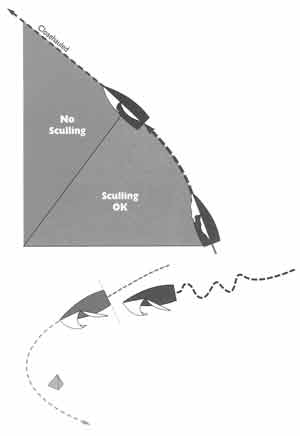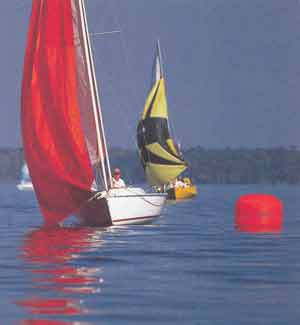A
New Twist on Sculling
by David Dellenbaugh
Rule 42: A new twist on sculling
Sculling is now defined as “Repeated
movement of the helm that is either
forceful or that propels the boat
forward or prevents her from moving
astern.” You are never allowed to scull
except for two very specific times that
are described in rule 42.3 (Exceptions).
The first exceptions (42.3d) is when you
are sailing above a closehauled course
and either stationary or moving slowly
(as when starting). In this case you are
allowed to scull to turn to a
closehauled course. The second exception
(42.3e) allows you to move your helm
repeatedly to reduce speed. No longer
are you allowed to scull the boat
through a turn.
|
Old
Sculling |
New
Sculling |
42 Propulsion
42.2 Prohibited Actions
Without limiting the
application of rule 42.1,
these actions are
prohibited...
d) sculling: repeated
movement of the helm not
necessary for steering; |
42 Propulsion
42.2 Prohibited Actions
Without limiting the
application of rule 42.1,
these actions are
prohibited...
d) sculling: repeated
movement of the helm that
is either forceful or
that propels the boat
forward or prevents her
from moving astern;
42.3 Exceptions
d) when a boat is above a
close-hauled course and
either stationary or
moving slowly, she may
scull to turn to a
close-hauled course;
e) A boat may reduce
speed by repeatedly
moving her helm. |
Rule 42 now includes a note that says
interpretations of rule 42 are available
at the ISAF website (www.sailing.org).
When you go to the website, look for the
updated edition of the “Rule 42
Interpretations Booklet.” This ISAF
publication is invaluable for
understanding the finer points of the
rules about kinetics. I highly recommend
this booklet for learning more about
sculling and all other propulsion
subjects.
There is
now only one situation when you are
allowed to scull forcefully to turn
your boat. This often happens when
you’re luffing on the starting line,
or if you get caught in irons.
Before sculling, you have to meet
the following conditions:
1) you must be sailing above a
closehauled course; and 2) You must
be either stationary or moving
slowly.
If both conditions apply, you may
scull to turn to a closehauled
course. Once you reach closehauled,
you are no longer permitted to
scull.
You are
not permitted to use sculling to
propel your boat forward or prevent
it from moving backward. However,
rule 42.3(e) says you may repeatedly
move your helm to reduce speed. This
is sculling in reverse, and it
requires a different rudder motion
than you’d use to move forward. One
place where it might be useful is
when you’re clear astern and trying
to avoid getting a late inside
overlap near a mark. |
 |
|
When a
boat loses steerageway, can she
scull to round a mark? The old rule
defined sculling as “repeated
movement of the helm not necessary
for steering (e.g. when rounding a
mark in light air), this wasn’t
considered sculling (even if it was
forceful), and it was permitted.
The
new rules, however, are different.
Repeated movement of the helm that
was forceful is not permitted unless
you are sailing above closehauled.
At a leeward or jibe mark, you could
move your fudder repeatedly to help
turn around it, but you can never do
this in a way that is ‘forceful’ or
that propels you forward at all. |
 |
Rule 41: Defining ‘outside help’
|
Old
Outside Help |
New
Outside Help |
|
41 Outside Help
A boat
may receive outside help
as provided for in rule
1. Otherwise she shall
not receive help except
for an ill or injured
crew member or, after a
collision, from the crew
of the other boat. |
41 Outside Help
A boat
shall not receive help
from any outside source,
except:
a) help as provided for
in rule 1;
b) help for an ill or
injured crew member;
c) after a collision,
help from the crew of the
other boat to get clear;
d) help in the form of
information freely
available to all boats;
e) unsolicited
information from a
disinterested source,
which may be another boat
in the same race.
|
The question of receiving outside help
while racing can be a tricky one, and
rule 41 has been revised in an attempt
to create a clearer and more enforceable
rule. The old rule 41 covered most of
the obvious infractions fairly well. It
was clear, for example, that you could
not get advice from your coach in the
middle of a race. But there were also
many grey areas. Was it permissible to
receive weather information from a VHF
radio? Was it OK if a competitor told
you about a line dragging off your
stern? And so on.
The new rule 41 has been broadened to
permit sailors to receive two new kinds
of outside help. The first is
“information freely available to all
boats.” This makes it OK, for example,
to listen to public weather broadcasts
(assuming you are permitted to have a
radio).
The second new type of permissible
outside help is “unsolicited information
from a disinterested source...” Note
that this help must meet two conditions.
First, it has to be “unsolicited,” which
means you cannot seek out such help - it
just has to happen. And second, the help
must come from someone who is
“disinterested.” The dictionary defines
disinterested as “free from selfish
motive or interest.” So it’s OK to
receive help from someone unless they
are acting in their own self-interest.
This automatically rules out help-givers
like coaches and parents.
Dave publishes the newsletter Speed &
Smarts. For a subscription call:
800-356-2200 or go to
www.speedandsmarts.com.

